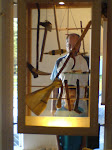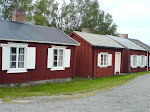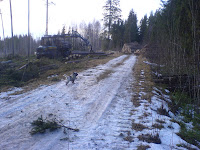How was it for the small baby, with her needs? Having to suppress them not to make her mother feel insecure, questioned, criticized? A mother that can lively imagine how it is for mothers! But what about how it was/is for the child? And a father that got outbursts too… How was that for a child too? A child that wasn’t allowed to react adequately either: with for instance disappointment, anger, fear etc. What existence was that?
Not getting ones needs filled, not being allowed to react adequately, how was that, what did it cause? The child had to suppress feelings, emotions, memories, maybe not all of it, but couldn’t keep the whole picture, including feelings and memories in details of the event? By the way Bosch means that there can exist back ground feelings, which are feelings that were almost always present and not connected to special events, but reflects the whole atmosphere in the family or household…
Having to fill unmet needs in a parent instead? That’s what too many of us had to, more or less?
What about real respect and empathy for the child, its feelings and needs? For her/him as human being? For her/his dignity, integrity, boundaries?
How can one demand and expect unselfishness etc. of the child, if it isn’t met itself with all this? If it has been badly treated, shouted at etc.?
No wonder if it should feel worthless?? Shouldn’t it if it has been treated like shit even? Or become hardened?
Bad self esteem was passed further… Never questioning the roots for it. As it is passed further it is believed, considered to be something inherited!? “It’s my character! I am just like this!” Or
“she/he is just lie that! It’s her/his nature!”
A child that is badly treated, whose needs aren’t got filled, blames itself, for being so lousy to take care of itself, for being so needy
“I’m just no good”, “It’s all my fault”, “I can’t do it or do anything”, “I’m just, plainly bad”…
It’s learned about its badness and inability, and connected to this are guilt feelings?? The less you have get your needs filled as a child the more guilt feelings? OR, as some, you push all guilt feelings away completely (so you can, as for instance Ingmar Bergman, just walk from woman to woman, including abandon your children too, or not least, which he did? Or you change friends, workplaces??).
Bosch means that to blame oneself is the first defence a child resorts to; for being such a failure, unable to love etc. To protect itself against the truth that there is nothing wrong with the child, but the parents. She means it is easier to blame oneself than to blame the ones you as child are totally dependent on, because to realize this truth about how they are meeting you etc., would be to painful for the child, it wouldn’t survive it. A grown up can, even if the pain is enormous today too and probably also as scary as then… As it was about life and death.
But to stay in that feeling, that defence (the Primary defence), would be too tiresome, it wouldn’t be possible for a longer time, instead the child switches to another defence, of one is false hope. If you are bad you can at least hope that you can be a better human being, and thus earn that love. If you just… then! Maybe! “I will get what I need, if I only…” Or you resort to the defence false power… Either by getting angry and through the anger you get a feeling of being powerful and in control, or get power and control (in your mind at least) by denying your needs.
Bosch writes at page 65-67:
“Employing the Primary defence is the first thing we do as children, to defend ourselves. The Primary defence is very simple and basic, and it is a defence mechanism employed by everyone /…/ … the Primary defence exists underneath all outside appearances, and is experienced (incorrectly) as a basic, intrinsic part of our nature by all of us.”
Yes, in the belief that it is “my character or nature (thus nothing I can do anything about! I was born like this)”.
She writes further:
“By definition babies and young children are helpless and dependent on others (the caregivers) to fulfil all of their needs (food, clothing, shelter, love, nurturing, safety, etc.). When those needs are not fulfilled from the outside by others, the child protects herself against this life threatening truth by thinking she should be able to meet these needs from within [Maybe also that she/he has strange, incorrect, faulty, erroneous, mistaken and too high demands etc.?] . But of course the child is still too young to do this. The result is the development of negative thoughts about ourselves. ‘There is something wrong with me because cannot take care of my needs’ [fulfil them myself, or it is something wrong with my needs and feelings and reactions!? Blaming itself.]. The Primary defence can consist of thoughts such as: I will never be able to do it., I’m bad, I’m just no good, I’ll never be good enough, I’m guilty, I am always the one who screws things up, nobody cares for me, I’m worthless, I’ll always be alone, I’m shameful etc. The Primary defence is characterized by all beliefs, thoughts and ideas that amount to a severely negative self evaluation. For some of us these beliefs focus more on the idea of being guilty and not good enough, ultimately leading to rejection (usually false hope identified people). For other the emphasise is on being an intrinsically bad person, only to be found out sooner or later by others and then rejected (usually false power identified people). For some the Primary Defence is more on the surface (false hope identification), for others it is pushed away very far (false power identification) /…/ The Primary defence is an effective defence because when we think something is wrong with us, we don’t have to feel the horror and pain of the old life threatening reality; that our survival needs were not me. Feeling something is wrong with us, prevents us from realizing that there was absolutely nothing wrong with the child we were. There was however, something wrong with the environment we were in; the environment (usually the parents) was not able to provide the child with what she needed.
Whilst providing an effective way to avoid clearly seeing the people around us for what they truly are, the Primary defence also gives the child a sense of control. If the child believes that her needs are not being met because something is basically wrong with her, this implies that she could change the predicament she is in. She owes her predicament to herself, so therefore there is maybe something she can do about it /…/ the reality that is being denied is the reality that we should never have had to fulfil our own needs in the first place. It was never our job to ‘do it’ (meet our own needs), it was our parents’ job. The child should have never even have had to think about how to meet her own needs, something of which she, of course, was incapable.”
Bosch writes at page 162 about the past reality integration therapy (PRI):
“The reason for reversing our defences is not to learn new skills or find ways to cope with difficult situations. PRI is not about learning new skills or coping. If possible we even try to avoid this, especially in the beginning of the therapy. This is not because we want to make it even harder than it already is, but because we do not want to cover up old pain with new coping skills when it surfaces. An opportunity to heal presents itself when we get a chance to access our old pain. New skills and coping behaviors would just take away that opportunity. The pain will then remain repressed and we will be vulnerable to new symbols. There is just no way to escape it.”
I am not sure you have to use the “PRI-method” though, this is not what I mean with quoting Bosch (or when I quote another person or method)… For less harmed it is perhaps enough just to talk about things with a wise person or only by writing liberate yourself (see Freyd and earlier blogposts about narrating).
But what I want to come to is that I think “only” learning new strategies and coping skills won’t change much, even if it at first feels very good to do so (if one succeed to). You will find new symbols to react on, and the problems will move to another area (new symbols), maybe a little bit more hidden both to yourself but also to the surrounding. And the worse, you will probably forward things to these who perhaps are dependent on you (preferably children, and most of all own children). If you want to avoid the latter you have to try to process your own, and many thinks and mean that healing is possible with appropriate help… Maybe healing the rest of your life?
And at last, Bosch writes at page 31-32:
“A mother might love the image of her ‘beloved daughter’ – her little, perfect, sweet and intelligent girl – instead of loving who her daughter really is. In this case the beloved daughter might feel lonely and unloved because the mother is concerned [consciously or unconsciously, but the effect is the same] about her own needs and not about her daughters.”
But the daughter is maybe not allowed to be too much either? How is this? Confusing? Causing ambivalence?
This could probably be changed to mother and son, father and son, father and daughter!?
There are connections between guilt feelings and being badly treated early in life? Of not getting ones early needs met???
---
Jag kommer bara att översätta Bosch-citaten ovan.
Bosch skriver på sidorna 65-67:
“Att använda det ursprungliga försvaret är det första vi gör som barn för att försvara oss själva. Det ursprungliga försvaret är mycket enkelt och grundläggande och det är en försvarsmekanism som används av alla /…/ … det ursprungliga försvaret finns under alla yttre sätt att te sig (sken) och upplevs (inte korrekt) som en grundläggande, inre eller inneboende natur hos oss alla.”
Ja, i tron att det är min ”läggning (således inget jag kan göra något åt! Jag föddes så här)”.
Hon skriver vidare:
“Per definition är babyar och små barn hjälplösa och beroende av andra (vårdnadsgivarna) för att få alla sina behov fyllda (mat, kläder, skydd, kärlek, näring, säkerhet osv.). När dessa behov inte fylls utifrån av andra, skyddar barnet sig mot denna livshotande sanning genom att tänka att det borde kunna möta dessa behov inifrån [kanske också att det har konstiga och felaktiga och för höga och/eller sjuka, konstiga krav, reaktioner, känslor, senare tankar osv.?]. Men naturligtvis är det lilla barnet fortfarande för litet för att göra det. Resultatet är utvecklandet av negativa tankar om oss själva. ’Det är någonting fel med mig när jag inte kan ta hand om mina behov [fylla dem själv, eller så är det fel på mina behov, känslor, reaktioner. Klandrande sig själv. Kännande sig skyldig för hur det är, det det känner, det det vill]. Det ursprungliga försvaret kan bestå av tankar sådana som: jag kommer aldrig att kunna göra det, jag är dålig, jag är inget bra, jag kommer aldrig att bli tillräckligt bra, jag är skyldig, jag är alltid den som rör till saker, ingen bryr sig om mig, jag är värdelös, jag kommer alltid att vara ensam, jag är en skam osv. Det ursprungliga försvaret karaktäriseras av övertygelser, tankar och idéer som innebär gravt negativ självutvärdering. Vissa av oss fokuserar mer på idén att vi är skyldiga och inte tilläckligt bra, ytterst ledande till [risk för] avslag/att bli förkastade (vanligtvis personer som kan identifieras som användande falskt hopp försvar). För andra ligger tyngdpunkten/betoningen på att vara en inneboende dålig människa, som förr eller senare måste avslöja sig för andra och då bli förkastad (vanligtvis falsk makt identifierade personer). För vissa ligger det ursprungliga försvaret närmare ytan (falskt hopp identifierade), för andra är det långt borttryckt (falsk makt identifierade) /…/ Det ursprungliga försvaret är ett effektivt försvar när vi tänker att något är fel med oss, då behöver vi inte känna skräcken eller smärtan från den livshotande realiteten; att våra behov för överlevnad inte blev mötta. Att känna att någonting är fel med oss skyddar oss från att inse att det absolut inte var något fel med det barn som vi var. Det var däremot någonting fel med omgivningen vi befann oss i; omgivningen (vanligtvis våra föräldrar) var inte förmögen att förse barnet med det det behövde.
Medan det effektivt förser oss med ett sätt att aktivt undvika att klart se människor omkring oss för vad de verkligen är, så ger det ursprungliga försvaret också barnet en känsla av kontroll. Om barnet tror att hennes behov inte möttes, därför att något är grundläggande fel med henne, låter det förstå att hon kan ändra det predikament hon befinner sig i. Hon har sig själv att tacka/skylla för sitt predikament. Så därför finns det kanske någonting som hon kan göra åt det /…/ verkligheten som förnekas är realiteten att vi aldrig skulle ha behövt fylla våra egna behov i första rummet [ens]. Det var aldrig vårt jobb att ’göra det’ (möta våra egna behov), det var våra föräldrars jobb. Barnet skulle aldrig ha behövt tänka på hur det skulle möta sina egna behov, någonting som hon, naturligtvis, var oförmögen att göra.”
Bosch skriver på sidorna 162 om past reality integration terapi (PRI, integrering av gången verklighet eller något sådant):
”Anledningen till att vi omvänder/omkastar våra försvar är inte för att lära oss nya skickligheter eller för att hitta vägar att handskas med svåra situationer. PRI handlar inte om att lära sig nya skickligheter eller för att ’cope’. Om möjligt så försöker vi till och med att undvika detta, speciellt i början av terapin. Det är inte för att vi vill göra det ännu svårare än det redan är, men vi vill inte hölja/dölja den gamla smärtan med nya coping-förmågor när de kommer till ytan. En möjlighet till helande visar sig av sig själv när vi får chansen till kontakt med vår gamla smärta. Nya skickligheter och coping-beteenden skulle bara ta bort den möjligheten. Smärtan kommer då att finnas kvar bortträngd och kommer att vara sårbar/känslig för nya symboler. Det finns ingen väg att fly den.”
Och till slut, Bosch skriver på sidorna 31-32:
”En mor skulle kunna älska bilden/avbildningen av sin ’älskade dotter’ – hennes lilla, perfekta, söta och intelligenta flicka – istället för att älska sin dotter som hon verkligen är. I detta fall kan hennes dotter känna sig ensam och oälskad därför att modern är befattad/bekymrad [medvetet eller omedvetet, men effekten blir densamma] med sina egna behov och inte sin dotters.”
Detta kan troligen gälla andra föräldrabarnrelationer, som mor - son, far - son, far - dotter.







































